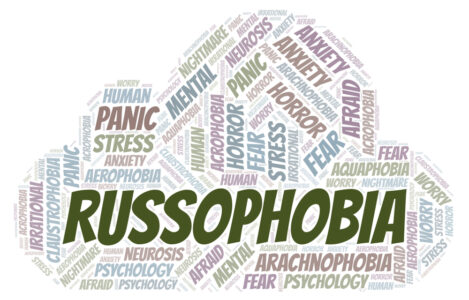Written by Uriel Araujo, researcher with a focus on international and ethnic conflicts.
Following what appears to be emerging as a new European trend, Paris has published a report that deems Marine Le Pen’s Rassemblement National party as a “communication channel for Russia”. Le Pen was questioned for 4 hours and described it as a witch trial. This provides a convenient scapegoat while France is facing major protests against the abuse of constitutional provisions to defend pension reforms. One should also keep in mind that Le Pen, as defeated presidential candidate, had vowed to pull France out of NATO’s military command last year.
In an episode that is not unrelated, a German court in Cologne found that Elena Kolbasnikova, a Ukrainian woman who lives there, had “posed a threat to public peace” by making “pro-Russian” comments during a TV interview. She was fined €900. Berlin also banned any Russian or Soviet flags during the latest May 9 Victory Day commemorations. In an attempt to combat supposed “extremism”, the state itself then becomes extremist. The hard truth is that free speech no longer exists in much of the West.
I’ve written on how the new Polish law, signed by President Andrzej Duda, weaponizes Russophobia to crush political dissent by creating a neo-Mccarthyist commission. In doing so, Warsaw is following Kiev’s steps. In Ukraine itself, with the ongoing conflict, as part of “anti-Russian” measures, there has been a war against the Orthodox Church, and no less than 11 political parties have been banned over their “pro-Russia” stances. Volodymyr Ishchenko, who is a research associate at the Institute of East European Studies (Freie Universität Berlin), argues that, since the 2014 Maidan revolution, “pro-Russia” has been used as a label to marginalize “anyone calling for Ukraine’s neutrality” as well as “state-developmentalist, anti-Western, illiberal, populist, left-wing, and many other discourses.” Current anti-Russian feelings in the West also feed on the tradition of anti-communist speech and extremist nationalism.
Already in March 2022, I wrote on the emerging trend of neo-Mccarthyist Russophobia, which in the West has built upon the dynamics of the “cancel culture” and has also inspired a kind of “state cancel culture” pertaining to foreign policy. We now see developments of this same trend materializing as domestic policy. This climate creates, amid economic and financial crisis in a deindustrialized Europe, a witch-hunt atmosphere which is a breeding ground for extremists, particularly of the far-right persuasion. This mirrors ongoing Ukrainian processes and political phenomena.
Ironically enough, merely describing the ugly reality of Ukrainian neo-Nazi militias turned into official parts of the state’s security apparatus (since 2014) is often labeled “Russian propaganda” – and yet a March 2022 Deutsche Welle article still properly described the Azov fighter as “extremists defending Mariupol” and as “far-right radicals” with “ties to extremists across Europe”. Azov is the most infamous one, but it should be noted that it is far from being the only Fascist military organization freely operating in Ukraine. According to a 2019 report, ultra-violent groups such as the National Corps and C14 benefitted from Kiev’s state funding for “national-patriotic education projects”.
While the West keeps arming and training Ukrainian official forces and mercenaries, it can certainly expect an increase in terrorism, crime and extremism within the European bloc itself, in a situation eerily reminiscent of the Gladio Operation during the Cold War years – when NATO funded European neo-Nazi and neo-Fascist groups as a covert anti-Soviet army. As I wrote before, the SITE Intelligence Group, specialized in tracking extremist groups, warned in February 2022 that there were European neo-Fascist militias ready to join Ukrainian neo-Nazis in their struggle.
Azov itself has been recruiting foreign mercenaries and volunteers, and Ukraine, in early 2022 had already become a new global hub for the far-right. The very ongoing whitewashing of Ukraine’s neo-Nazi Azov regiment and other such Ukrainian groups has opened a window of opportunity for far-right forces in Europe to rehabilitate Fascism. There currently are 4 million Ukrainians benefitting from the EU emergency “temporary protection directive”, the vast majority of them being civilians escaping the horrors of the ongoing conflict – but some of several Azov commanders who fled to Poland are likely to establish dialogue and working alliances with European networks. All of them can benefit from the current anti-Russian wave.
In order to keep such far-right networks at control, Western powers are likely to tighten anti-democratic measures domestically while at the same time covertly aiding them, as they have so far done with Ukrainian radical groups themselves. In Germany itself secret services connections to neo-Nazi groups have come to light already in 2011, when a BfV agent was found to be linked to neo-Nazi terrorism.
The neo-Mccarthyism that has started to emerge in Poland and France, for instance, should be seen as part of the larger context thus described, and the next logical development would be to ban dissent political parties. So far, it is too soon to expect that but it would not be too far fetched to imagine Orthodox religion and spirituality also being not only “canceled” but generally persecuted or sanctioned within Western countries, if the current climate escalates. The current situation in Europe could thus be described as the “Ukranization” of the continent, with worrisome consequences.






